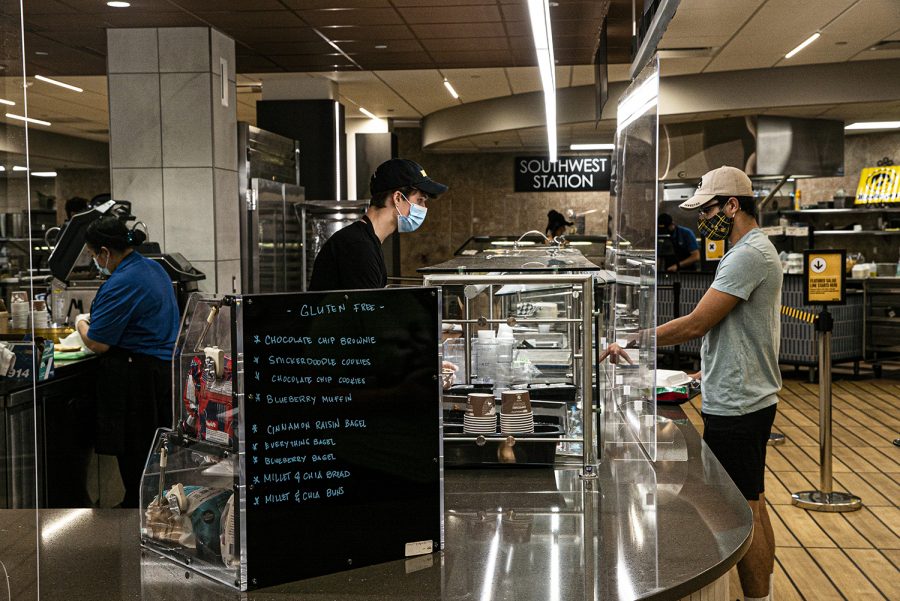Opinion | UI dining halls should be take-out only
My experience working in the dining hall shows me why the UI shouldn’t have opened up in-person dining.
Tate Hildyard for The Daily Iowa
A Burge Marketplace worker serves a line of students on Monday, August 26th, 2020. Due to health and safety regulations as a means of preventing the spread of COVID-19, the dining hall process has been streamlined with an advanced registration process and a takeout meal process.
March 10, 2021
Ever since the COVID-19 outbreak began in March 2020, the administration at the University of Iowa has had a mixed track record of how they have responded to the unusual series of events that have followed.
The latest decision made to open back up dining halls is one that has raised many eyebrows. Some are in horror, some are in frustration, but many of them just ask one word: why?
Mid-fall, the Housing and Dining staff and on-campus students were given a survey that asked if they wanted the University was to resume indoor dining in a limited capacity. The result was predictable: 72.2 percent of students were against limited indoor dining.
However, the administration still decided to open them back up anyway.
As an employee in Burge Dining Hall, my experience makes me believe that this could be very problematic for staff members because of understaffing issues, and it has the potential to spread the virus.
Despite the strong work ethic that the staff and I have, we get overwhelmed for periods of time by the sheer amount of students who are asking for food, which results in long lines. The operation is not sufficiently staffed as it is, even without indoor dining taking resources away.
Dining indoors requires the already strained management to devote students to monitor the few students who choose to do the indoor dining, leaving other stations with fewer workers. When the lines result in being longer because of this, it will leave nobody satisfied.
The dining staff had a strong system in place during the fall semester that should continue during the spring. Student take-out was the most efficient way for us to operate with COVID-19 precautions we needed to take.
Beyond the resources required to be allocated and how it affects the whole operation, there is the matter of the virus itself. According to the university campus update, the number of self-reported cases of COVID-19 among students is currently six, with two new cases among employees.
While case numbers are down and people are slowly getting vaccinated, we should still be taking proper precautions to limit the spread. If the reckless behavior seen on Friday nights at bars is any indication, and students who are not vaccinated behave like they are, that is worrying as an employee considering the following morning many of them go to the dining halls to get food.
While a mask requirement creates a barrier for transmission, we shouldn’t put employees in a place where the virus has greater potential to spread.
With indoor dining, this potentially opens up the door for it to happen. It possibly won’t be through the fault of the staff who are doing everything possible to make sure things are as safe and clean as possible, but through the recklessness and naivety of the students who might partake in it.
There is not enough staff available to oversee indoor dining, and it’s unfair to open them back up when the majority of workers —including myself — were against it.
It has been only around a week, there is still time for the university to make the right decision and stop indoor dining. Maybe this worry is all for nothing, but we shouldn’t take the risk anyway.
Columns reflect the opinions of the authors and are not necessarily those of the Editorial Board, The Daily Iowan, or other organizations in which the author may be involved.














